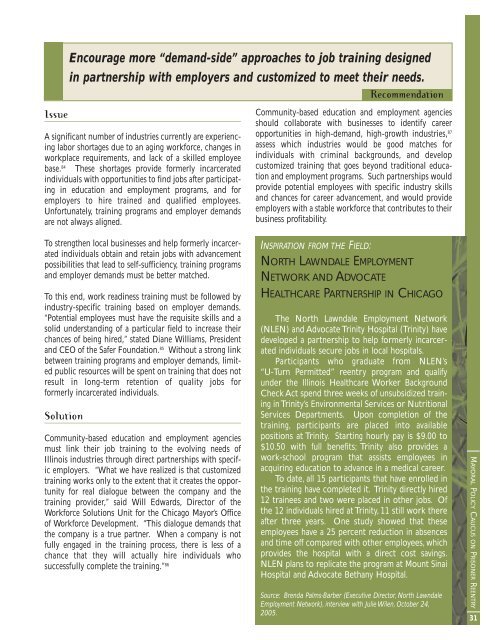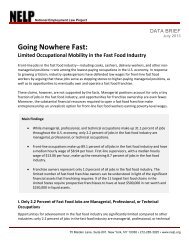Rebuilding Lives. Strengthening Communities.
Rebuilding Lives. Strengthening Communities.
Rebuilding Lives. Strengthening Communities.
You also want an ePaper? Increase the reach of your titles
YUMPU automatically turns print PDFs into web optimized ePapers that Google loves.
Issue<br />
Encourage more “demand-side” approaches to job training designed<br />
in partnership with employers and customized to meet their needs.<br />
Recommendation<br />
A significant number of industries currently are experiencing<br />
labor shortages due to an aging workforce, changes in<br />
workplace requirements, and lack of a skilled employee<br />
base. 84 These shortages provide formerly incarcerated<br />
individuals with opportunities to find jobs after participating<br />
in education and employment programs, and for<br />
employers to hire trained and qualified employees.<br />
Unfortunately, training programs and employer demands<br />
are not always aligned.<br />
Community-based education and employment agencies<br />
should collaborate with businesses to identify career<br />
opportunities in high-demand, high-growth industries, 87<br />
assess which industries would be good matches for<br />
individuals with criminal backgrounds, and develop<br />
customized training that goes beyond traditional education<br />
and employment programs. Such partnerships would<br />
provide potential employees with specific industry skills<br />
and chances for career advancement, and would provide<br />
employers with a stable workforce that contributes to their<br />
business profitability.<br />
To strengthen local businesses and help formerly incarcerated<br />
individuals obtain and retain jobs with advancement<br />
possibilities that lead to self-sufficiency, training programs<br />
and employer demands must be better matched.<br />
To this end, work readiness training must be followed by<br />
industry-specific training based on employer demands.<br />
“Potential employees must have the requisite skills and a<br />
solid understanding of a particular field to increase their<br />
chances of being hired,” stated Diane Williams, President<br />
and CEO of the Safer Foundation. 85 Without a strong link<br />
between training programs and employer demands, limited<br />
public resources will be spent on training that does not<br />
result in long-term retention of quality jobs for<br />
formerly incarcerated individuals.<br />
Solution<br />
Community-based education and employment agencies<br />
must link their job training to the evolving needs of<br />
Illinois industries through direct partnerships with specific<br />
employers. “What we have realized is that customized<br />
training works only to the extent that it creates the opportunity<br />
for real dialogue between the company and the<br />
training provider,” said Will Edwards, Director of the<br />
Workforce Solutions Unit for the Chicago Mayor’s Office<br />
of Workforce Development. “This dialogue demands that<br />
the company is a true partner. When a company is not<br />
fully engaged in the training process, there is less of a<br />
chance that they will actually hire individuals who<br />
successfully complete the training.” 86<br />
INSPIRATION FROM THE FIELD:<br />
NORTH LAWNDALE EMPLOYMENT<br />
NETWORK AND ADVOCATE<br />
HEALTHCARE PARTNERSHIP IN CHICAGO<br />
The North Lawndale Employment Network<br />
(NLEN) and Advocate Trinity Hospital (Trinity) have<br />
developed a partnership to help formerly incarcerated<br />
individuals secure jobs in local hospitals.<br />
Participants who graduate from NLEN’s<br />
“U-Turn Permitted” reentry program and qualify<br />
under the Illinois Healthcare Worker Background<br />
Check Act spend three weeks of unsubsidized training<br />
in Trinity’s Environmental Services or Nutritional<br />
Services Departments. Upon completion of the<br />
training, participants are placed into available<br />
positions at Trinity. Starting hourly pay is $9.00 to<br />
$10.50 with full benefits; Trinity also provides a<br />
work-school program that assists employees in<br />
acquiring education to advance in a medical career.<br />
To date, all 15 participants that have enrolled in<br />
the training have completed it. Trinity directly hired<br />
12 trainees and two were placed in other jobs. Of<br />
the 12 individuals hired at Trinity, 11 still work there<br />
after three years. One study showed that these<br />
employees have a 25 percent reduction in absences<br />
and time off compared with other employees, which<br />
provides the hospital with a direct cost savings.<br />
NLEN plans to replicate the program at Mount Sinai<br />
Hospital and Advocate Bethany Hospital.<br />
Source: Brenda Palms-Barber (Executive Director, North Lawndale<br />
Employment Network), interview with Julie Wilen, October 24,<br />
2005.<br />
MAYORAL POLICY CAUCUS ON PRISONER REENTRY<br />
31
















